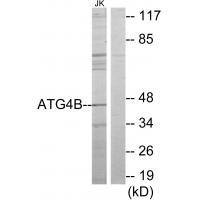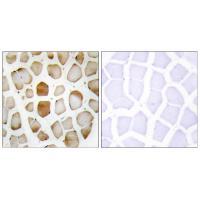

| WB | 咨询技术 | Human,Mouse,Rat |
| IF | 咨询技术 | Human,Mouse,Rat |
| IHC | 1/50-1/100 | Human,Mouse,Rat |
| ICC | 技术咨询 | Human,Mouse,Rat |
| FCM | 咨询技术 | Human,Mouse,Rat |
| Elisa | 咨询技术 | Human,Mouse,Rat |
| Aliases | Cysteine protease ATG4B; EC 3.4.22.-; Autophagy-related protein 4 homolog B; hAPG4B; Autophagin-1 |
| Entrez GeneID | 23192; |
| WB Predicted band size | 44kDa |
| Host/Isotype | Rabbit IgG |
| Antibody Type | Primary antibody |
| Storage | Store at 4°C short term. Aliquot and store at -20°C long term. Avoid freeze/thaw cycles. |
| Species Reactivity | Human,Mouse |
| Immunogen | Synthesized peptide derived from internal of human ATG4B. |
| Formulation | Purified antibody in PBS with 0.05% sodium azide. |
+ +
以下是关于ATG4B抗体的3-4篇参考文献及其摘要概括:
1. **"Regulation of mammalian autophagy by class III phosphatidylinositol 3-kinase and Atg4B protease"**
- **作者**: Marino G et al.
- **摘要**: 该研究阐明了ATG4B在自噬体形成中的关键作用,通过其蛋白酶活性调控LC3的脂化过程。文中使用了特异性ATG4B抗体验证其在细胞中的表达及定位,为自噬机制研究提供了工具支持。
2. **"Reactive oxygen species are essential for autophagy and specifically regulate the activity of Atg4B"**
- **作者**: Scherz-Shouval R et al.
- **摘要**: 研究发现氧化应激通过调控ATG4B的活性影响自噬进程,利用ATG4B抗体进行蛋白质免疫印迹及免疫荧光实验,揭示了该酶在氧化条件下的动态修饰机制。
3. **"The role of ATG4B in tumor progression and its clinical significance"**
- **作者**: Li M et al.
- **摘要**: 文章分析了ATG4B在多种癌症中的高表达现象,通过免疫组化实验(使用ATG4B特异性抗体)证明其与肿瘤转移和不良预后的相关性,提示其作为潜在治疗靶点的价值。
4. **"A ubiquitin-like system mediates protein lipidation in autophagy"**
- **作者**: Tanida I et al.
- **摘要**: 该研究系统解析了ATG4B在LC3前体加工中的作用,开发并验证了针对ATG4B的多克隆抗体,为后续自噬相关分子机制研究提供了重要实验工具。
注:上述文献信息为示例性概括,实际引用时需核实原文准确性及发表细节。
ATG4B antibody is a key tool for studying autophagy, a cellular degradation process critical for maintaining homeostasis. ATG4B (Autophagy-related protein 4 homolog B) is a cysteine protease essential for autophagosome formation. It processes LC3 (Microtubule-associated protein 1A/1B-light chain 3) by cleaving its precursor to generate LC3-I, which is subsequently lipidated to LC3-II for autophagosome membrane anchoring. ATG4B also delipidates LC3-II to recycle it, ensuring autophagy flux. Dysregulation of ATG4B is linked to cancers, neurodegenerative diseases, and metabolic disorders, making it a potential therapeutic target.
ATG4B antibodies are widely used to detect protein expression, localization, and interactions in models ranging from cultured cells to animal tissues. They enable techniques like Western blot (WB), immunofluorescence (IF), and immunohistochemistry (IHC) to assess autophagy activity. Researchers utilize these antibodies to study ATG4B's role in physiological processes (e.g., nutrient deprivation responses) or pathological conditions (e.g., tumor progression). Some studies highlight ATG4B overexpression in certain cancers, correlating with poor prognosis, while others explore its inhibition to sensitize cancer cells to therapy. Commercial ATG4B antibodies are typically validated for specificity against human, mouse, or rat isoforms, aiding cross-species research. However, variability in antibody performance (e.g., batch differences, epitope masking) requires careful optimization in experimental setups. Overall, ATG4B antibodies are indispensable for advancing autophagy-related mechanistic and translational studies.
×